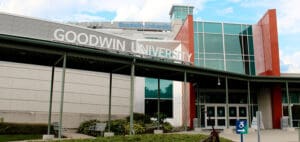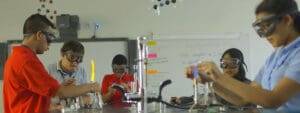

- Matt Dadona, Assistant Superintendent of Pathways and Partnerships
- David Daye, Director of Magnet School System Operations
- Sal Menzo, Superintendent of Goodwin Magnet Schools
- Cliff Thermer, Assistant Vice President for Strategy and Business Development, and Dean of Goodwin’s School of Business, Technology, and Advanced Manufacturing
NAN PRICE: In what ways is the Goodwin University Magnet School System “a holistic educational track?”
DAVID DAYE: The Goodwin University Magnet School System provides a holistic educational track by focusing on the whole child and the community. We encourage families and scholars to engage, explore, and experience the uniqueness of their educational journey together.
Through innovative, hands-on, and project-based curriculum that immerses students in a world of promise, the Goodwin University Magnet School System is responsive to the academic needs of the students while considering external factors that contribute to their well-being.
Our staff challenges students to consider how their decisions impact others and society. With a core belief that all students can achieve excellence and must strive to create a more just society, we encourage students to use their voice through choice. We’re committed to the social emotional development of students and providing access to resources, such as our Ann B. Clark Community Co-Op.
NAN: How do the magnet schools’ five pathways create opportunities that, in turn, create a workforce pipeline and help keep jobs in Connecticut?
MATT DADONA: We’ve listened to our educational and industry partners to determine the pathways open to our students. The pathways in advanced manufacturing, computer science, and liberal arts have been established at the school and are creating options for students that they may not have at a traditional high school.
We’re adding medical careers and business and entrepreneurship pathways to further the options we provide to our scholars. All of these pathways will help our students get the skills they need to be successful in their field of choice.


The goal of these pipeline programs is to connect our students to companies that want to invest in them by hiring and then further training them for a successful career in that industry. With the unique benefit of having two universities—Goodwin University and the University of Bridgeport—as part of our family of educational services, we’re equipped with incredible resources for our scholars as we strive to meet the industry needs within Connecticut.
NAN: Tell us about the collaborations you’re forming across the state.
MATT: We’re working with various school districts, businesses, and workforce development organizations to help create opportunities for our students. We partner with school districts to help them develop in-demand, high-skill, high-paying career pathways that are vertically aligned within the school district.
We offer professional development, curriculum and pathway development, articulated university courses, and support to districts. Our training for teachers is offered at districts on equipment or instructional strategy or on our campus for technical skill development.
We work with local businesses to provide field trip experiences, guest speakers, mentors, job shadowing, internships, and advisory committee to inform our practices. Finally, we partner with organizations like ReadyCT, Connecticut Business and Industry Association (CBIA), and the Connecticut Center for Advanced Technology, Inc. (CCAT) to ensure our programs align with the needs of industry, help recruit students for our pathway, and create career opportunities.
SAL: We’re also working with communities to engage them in the collective impact process to help them identify areas of focus surrounding workforce developed directly related to advanced manufacturing. Helping communities develop an educational and business ecosystem enables them to proactively plan for economic sustainability and growth. This is a key focus of the work of the Governor’s Workforce Council, of which I am a member.
NAN: Why is it specifically important to create career opportunities in advanced manufacturing?
CLIFF THERMER: There are more than 5,000 current job openings in manufacturing, ranging from CNC machinists to quality technicians to engineers and managers. The jobs gap that exists will only grow as the number of workers in manufacturing retire.
In addition to the number of jobs available, the average pay in Connecticut is $67,770 for a CNC machinist. These careers offer advancement opportunities and enable our students to be a part of a high-tech industry helping to advance our society.
Connecticut needs “maker talent” that exists within our young people. Bringing out students’ hidden talents and getting them excited about making things is important for Connecticut’s manufacturing economy and their own personal financial strength.
NAN: What types of programs are available for students?
SAL: We offer our Early College Advanced Manufacturing Pathway (ECAMP™) for students at Connecticut River Academy as well as our partner districts. Students can earn up to 21 credits from Goodwin University while still in high school. This program is an approved pre-apprenticeship program and students have the option to continue their education upon high school graduation or enter the workforce for a local manufacturing company.
Key to these relationships is the establishment of authentic work-based experiences while students are in high school. These internships and apprenticeships are all in collaboration with the Connecticut Department of Labor.
NAN: How are you connecting with local companies?
MATT: We work with local companies to establish partnerships and help expose our students to what a job in the field looks like by having them experience field trips, guest speakers, job shadowing, and internships. We also help them to develop their soft skills or essential skills so they’re prepared to collaborate within their organization.
CLIFF: There are some 4,000 manufacturers in Connecticut and we work with a number of them by bringing them to campus to inspire our students and to expose them to career opportunities. These manufacturers are hungry for this talent and building this pathway to careers is a true partnership between educators and employers.”
Learn more about Goodwin University
www.goodwin.edu | Facebook | Instagram | LinkedIn | Twitter | YouTube
